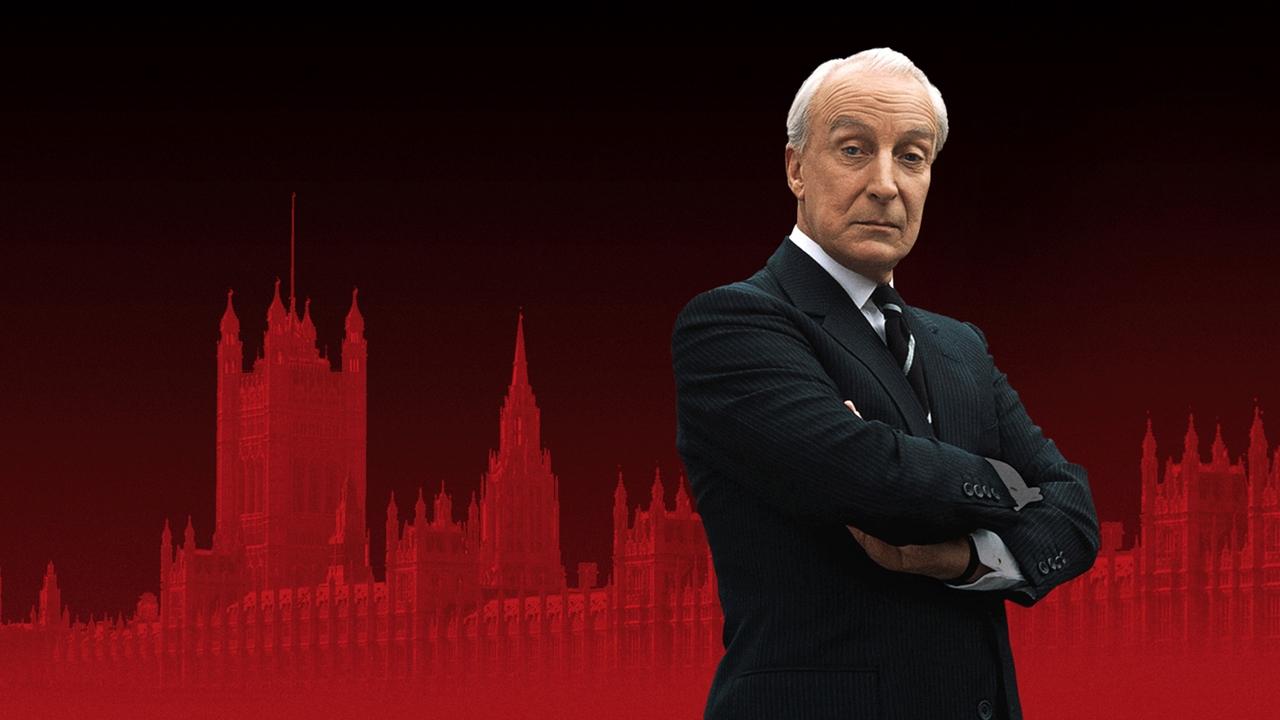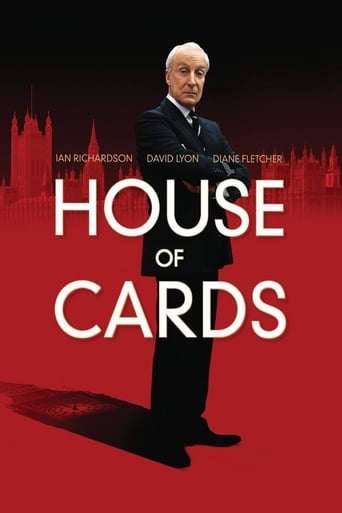

If the ambition is to provide two hours of instantly forgettable, popcorn-munching escapism, it succeeds.
... View MoreIt isn't all that great, actually. Really cheesy and very predicable of how certain scenes are gonna turn play out. However, I guess that's the charm of it all, because I would consider this one of my guilty pleasures.
... View MoreIn other words,this film is a surreal ride.
... View MoreIt's simply great fun, a winsome film and an occasionally over-the-top luxury fantasy that never flags.
... View MoreFrancis Urquhart is a senior member of the British Government. He expects a promotion when the new Prime Minister, Henry Collingridge, takes office and is bitterly disappointed when this does not take place. He sets in motion a plan to usurp Collingridge and become Prime Minister. Part of his plan involves manipulating a junior political reporter, Mattie Storin, in order to gain more favourable press coverage than Collingridge. This works well initially but then Storin starts digging into recent political events.Superb political drama. Very intriguing and highly plausible with some very sharp dialogue. The political machinations are quite believable. Quite Shakespearean in its wheels-within-wheels, examinations of the worst parts of human nature and outcome. Great performance by Ian Richardson as Urquhart. He embodies all that is to be loathed, and yet grudgingly admired, about politics, and does so with a cunning charm and spot-on delivery. Good support by Susannah Harker as Mattie Storin.I much preferred this, the original House of Cards, to the far more famous recent US version. The US version seemed all about Machiavellian machinations just for Machiavellian machinations' sake. There was no point to many of the intrigues and sub-plots, other to fill up space. This, the UK version, was much more focussed, was far less gratuitous in its scheming and knew when to stop.
... View MoreI have watched this after watching the American version of House of Cards. The American adaptation is truly exceptional and Kevin Spacey gives on a stellar performance as Francis. I was pointed towards this after being so impressed with the Netflix series. The British House of Cards was a great series. Ian Richardson steals the show as the Chief Whip who has been looked over after years of loyalty. Being so senior and respected it is that much easier to execute his plans to bring his rivals down. Having watched the American series I kind of knew what would follow and what role certain characters would play such as Mati and Roger. Still one cannot appreciate the great story lines and good performances. This was the show that started it all and the iconic monologue from the protagonist. As a series it was well ahead of its time. Perhaps the only criticisms are how easy and convenient everything seems for Francis to rise to power and eliminate his foes. Despite being senior and respected his foes never began to question him and questioned everyone else around including longtime friends. Even after Francis blackmails Roger and forces him to pimp out the girl he loves Roger still calls Francis a good friend and people don't question obvious agendas. The Netflix series was more realistic, despite some moronic claims it wasn't. The Frank there was later questioned and called out on being a liar and having an agenda. The Francis character is truly exceptional and an adaption of him makes for great viewing. It is no wonder the American version has become so popular. Francis and his political aims share similarities to Iago in Shakespeare's Othello. He was driven to bring those down around him including his master, however Francis seems more in control and playing the long game.
... View MoreI somehow missed this series on its first BBC broadcast well over 20 years ago but went looking for it after seeing the recent David Fincher / Kevin Spacey Americanised remake, which I had much enjoyed. Looked at today, I'd have to say I prefer the remake. In my opinion, the poisonous mix of sex, politics and power plays better against the backdrop of the more open and ruthless brand of politics across the water than staid old Britain. Unlike Spacey, Ian Richardson as the reptilian villain of the piece exudes no sex-appeal whatsoever, so that you get no sense of a physical attraction between him and the young female investigative reporter (Susanne Harker), indeed there are almost no bedroom scenes of the couple to hammer home this point.I also found the plot-lines just too fanciful and unbelievable, Richardson's Francis Urquhart character's stop-at-nothing persona taking the cliché of the utterly selfish and self-deluding politician's ambition a bit too far. Yes, there are identifiable types in the background characters, but that's all they are, ciphers more than characters. As a for instance, the American series builds up the background character of Urquhart's wife more effectively than here, while complicit in her husband's rise up the ranks, she too is a shadowy, unsubstantial figure, another wasted opportunity. The only person we're interested in is Urquhart and besides himself the only people he appears interested in are we the viewer, as he breaks the fourth wall and speaks out directly to his untouchable audience. This first series ends up with a bang, literally, but shockingly spectacular as it is, it's too fantastical and doesn't ring true, like lots of other plot-lines in the show.The acting is very good, despite my observations above, Richardson obviously relishing every line, especially the now familiar tag-line "...I couldn't possibly comment". This was still however racy, entertaining viewing although even knowing it was written by a Westminster insider, I never got the sense that I was close to the realms of truth, but once that point is conceded, this parliamentary pantomime is fun to watch.
... View MoreI've been hearing for years how great the House of Cards BBC series is but like a lot of other things in life, watching the series was something I always meant to do but never got round to it. Then I read the books by Michael Dobbs, found the books awful to read and went off the whole trilogy. But when I came into some money recently, I decided to take a chance and finally watch the series and by God, I'm glad I did! Forget the books! The TV series rules! This is almost 11 hours (3 DVD's) worth of top quality entertainment. My life ground to a halt for two days because I was addicted! This is the kind of drama that makes the BBC world-famous. Nothing can beat it.Ian Richardson plays a show-stealing performance as Francis Urquhart, the government Chief Whip, who lies, cheats and tramples his way to Downing Street, leaving bodies, wannabe leaders, and carnage in his wake. The first in the series "House of Cards" sees Urquhart being snubbed and passed over for promotion by the Prime Minister Henry Collingridge (who I'm convinced is an imitation of John Major!). Urquhart vows revenge and we watch as he engineers Collingridge's downfall. Urquhart runs for the leadership and after a nasty battle with rivals, he wins by cheating & blackmail. The ending to Part One is shocking and shows how far Urquhart is prepared to go to get what he wants. The ending to part one is something which is constantly brought up in parts 2 & 3.The next in the series, "To Play the King" is I think the best of the three. Urquhart is securely installed at number 10 when the Queen vacates her position (it isn't made clear whether she dies or abdicates). Anyway, the next in line is the King (clearly imitating Prince Charles) and Michael Kitchen plays a fantastic King who decides that he is more important than the Prime Minister. He and Urquhart butt heads as each one tries to assert their authority over the other, and it isn't helped by the King's advisors who egg him on to directly confront Urquhart. Again, the ending to part two is shocking and brutal as Urquhart decides to silence those who are plotting against him.The last in the series, "The Final Cut" shows Urquhart in his 11th year as Prime Minister. He is set to beat Mrs Thatcher as the longest serving Prime Minister but the public are tiring of him and want him out. His Foreign Secretary, Tom Makepeace, challenges his authority and Urquhart fires him for it. But instead of silencing him, being fired makes Makepeace decide he has nothing to lose and he decides to force Urquhart out. Meanwhile, Cyprus is about to get a peace agreement and Urquhart decides that he could use the situation to make a little pension fund for himself and also silence Makepeace into the bargain. But he never counted on a secret from his past to come back to hurt him...the ending to "The Final Cut" is both stunning and unexpected.A few little comments - there are some small differences between the books and the TV adaptation. But I think that the changes are for the better. I never liked how the books were written. Richardson breathes life into the character of Urquhart and the story changes make the stories BETTER, not worse. We also see how scheming and manipulative Mrs Urquhart is, and the thug of a protection officer, Corder, who is assigned to protect the Prime Minister. In each of the series, we see that Urquhart's ultimate downfall is due to the female company he keeps. Each woman is a Judas and a Brutus, ready to stab him in the back.I especially like how Richardson often speaks directly into the camera as if he is directly talking to the viewers. It's as if he is bringing you into his conspiracies and asking you to take part in his dirty work. Urquhart is devious, ruthless and will do whatever it takes. You will cheer him on and root for him as he takes on his enemies like a pit bull terrier.Oh and look out for Colin Jeavons as Tim Stamper. You'll recognise him as Inspector Lestrade from the Sherlock Holmes episodes.So is it worth getting this DVD? To quote the Right Honourable Francis Urquhart MP, "you might very well think that but I couldn't possibly comment!"
... View More